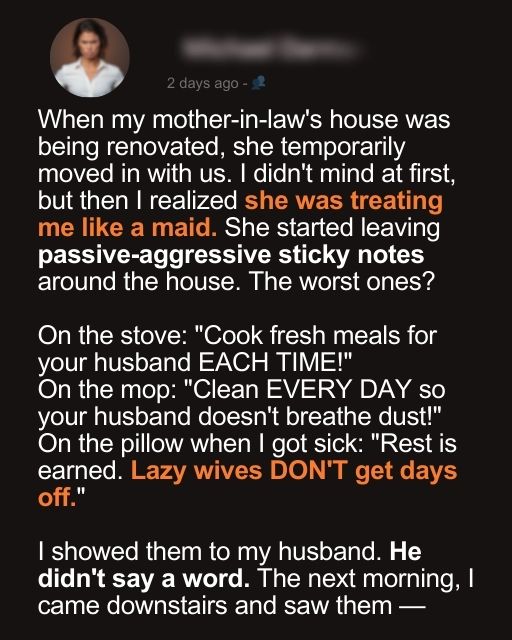When my mother-in-law moved in “for a few weeks” while her kitchen was torn up, I told myself it would be fine. I even made up the guest room with fresh sheets and put flowers on the nightstand. By day three, the flowers looked like I felt—drooping under the weight of something I couldn’t name.
The something turned out to be neon.
It started with a hot-pink sticky on the stove: Cook fresh meals for your husband EACH TIME! Another was taped to the mop: Clean EVERY DAY so your husband doesn’t breathe dust! When I came down with a fever, I found one on my pillow: Rest is earned. Lazy wives DON’T get days off.
I brought them to my husband, laid them on the table like evidence. He stared at the notes, then at his coffee, and said nothing. The next morning, they were stacked in tidy piles on the counter alongside a handwritten line in his mother’s spidery script: If you need help keeping up, I can stay longer.
That wasn’t an offer. It was a verdict.
After that, the notes multiplied. One inside my shoe (Heels are for husbands’ eyes, not for errands). One under my coffee mug (Decaf is for women who nap). One on my toothbrush (Floss more. Smiles are a wife’s first duty). I began to tread through my own home like a guest who might be charged for touching anything.
I lasted a week before I snapped. I wrote one note—one—and slipped it under her door: I’m trying my best. I am not a maid.
No response, not a word. Just a colder version of the same house: click of her bedroom door, the cluck of her tongue when I folded laundry “wrong,” the sighs that said more than her sentences.
Then, by accident, I found a photograph.
It was tucked inside a paperback she’d left on the couch, half a page marking a chapter. In the picture, she was younger, hair loose, holding a baby with the kind of smile you never fake. On the back, in a rushed, crooked hand: My little angel, lost too soon.
The room tilted. For the first time, I saw more than a critic with a Post-it dispenser. I saw a woman who had learned to grip control so hard it turned to rules, a woman whose idea of love had calcified into instructions because the soft parts of life had once shattered in her hands.
That night, I cooked chicken pot pie—her favorite, the way she’d once described it to me, buttery crust and a splash of sherry in the filling. I didn’t leave a manifesto. Just a small square of paper that said, Thought you might like this.
In the morning she stood over the pie like she’d stumbled upon a memory. She looked up at me—really looked, past the list of things I wasn’t—and said, “Thank you.” It landed between us like a truce flag the size of a napkin.
The notes didn’t disappear, but they softened. Clean the baseboards morphing into Do you want me to get the baseboards today? Don’t wear black at breakfast (crumbs show) turning into I’m making tea—want some? She started asking, in her stiff, sideways way, how I was feeling. I started answering, even when the honest answer was tired.
One afternoon, I found her in the attic with dust in her hair, sifting through boxes like an archaeologist of her own life. She jumped when she saw me, then smoothed her blouse. “I was trying to find something for Talen,” she said. “A… a birthday thing. An old one.” The sentences were fragile, as if they might break.
“Want help?” I asked.
She hesitated, then nodded. We sat cross-legged on the floor and opened boxes. I learned she had wanted to be a music teacher once. That she had married young because everyone did and buried a child because no one should. That after her husband died, the house got too quiet and the silence made her speak in commands to feel like someone was listening.
I listened. I asked questions. I handed her a jewelry box with a broken clasp and watched her turn it over in her hands like it might tell her how to be softer.
The day I least expected it, I came downstairs to find her packing a small suitcase. “I thought I’d stay a few more weeks,” she said without looking at me. “But I think… it’s time I go back home.” She tugged the zipper closed, then met my eyes. “I’ve realized I’ve been hard on you. Harder than I needed to be.”
Relief flooded me, confusingly threaded with something like compassion. “Thank you for saying that,” I said. “Do you need a ride?”
She shook her head, then stepped forward and hugged me—stiffly at first, then with a surprising kind of warmth. “Thank you for the pie,” she whispered into my shoulder, which, somehow, meant thank you for seeing me.
After she left, the house exhaled. My husband did too. He stood in the kitchen where the piles of notes had been and rubbed the back of his neck. “I should’ve defended you,” he said. “I see now how much you were carrying.”
“Next time,” I said, not unkindly, “please don’t make me carry it alone.”
That night, we ate dinner without an instruction in sight. The conversation meandered. We laughed. I went to bed and there was nothing on my pillow except a clean case and a sense that home belonged to us again.
A few months later, my phone lit up with her name. “I wanted… your advice,” she said, voice careful. She was thinking about taking a watercolor class. Was that silly at her age? I told her it sounded beautiful. She laughed, a little embarrassed, like a girl daring herself to be happy.
I don’t romanticize those weeks. They were hard. She could be sharp as a pin and I still find Post-its in odd places when I deep-clean—the ghost of a season when love wore a scowl. But I keep going back to that photo scribbled with grief, the broken jewelry clasp, the quiet “thank you” over chicken pot pie. Those were the breadcrumbs that led me out of the woods.
Here’s what I learned: not every battle requires a sword. Sometimes the braver thing is to put the armor down and reach for the story under the behavior. Control often has a root. So does silence. My husband’s came from years of learning to keep the peace at any cost; hers grew out of loss so old it had hardened into rules.
Compassion didn’t excuse the notes. It changed their power. It changed mine, too.
If you’re living with someone who seems impossible, try this once: pause the counterattack and look for the human under the habit. Feed the part of them that remembers how to be warm. You might not get an apology right away. You might only get a softer note, a cup of tea, an attic story. It might be enough to shift the house an inch toward light.
And if you’re the person who should’ve spoken up, say so. Then do it differently next time.
Our home is brighter now—fewer rules, more meals that taste like care, a family learning that love is not a checklist but a practice. When I feel myself boiling, I picture her younger, the baby in her arms, the words on the back of that photo. I take a breath. I try for the kinder road if I can.
Most days, it gets us where we need to go.




